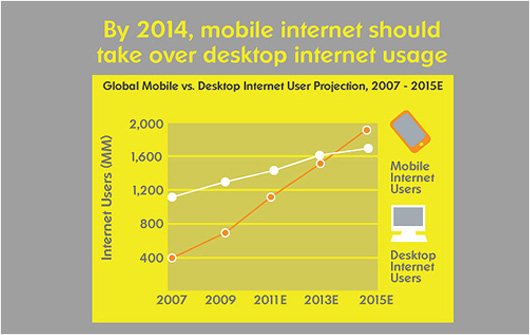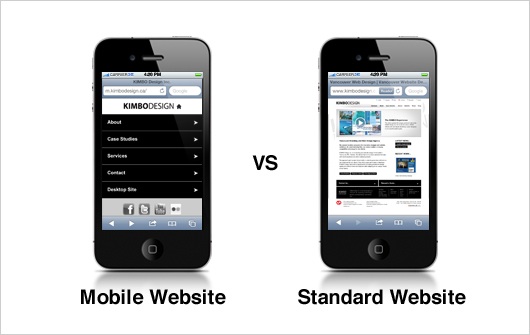If you are a business owner, now is the time to get off the fence. Over 70% of the world’s population is using a mobile device. This means that you MUST have a mobile optimized website.
Mobile technology is one of the most rapidly growing industries in the world today. According to studies and research, mobile Internet usage has increased 30% every year since 2009. During the first half of 2011, there were approximately 4 billion mobile phone users around the world; 1.08 billion of those were smartphone users. And the numbers are only rising. Experts predict that mobile usage will exceed desktop Internet usage by 2014.

Image Credit: Digital Buzz Blog
The difference between a mobile website and a normal website
The main difference between a mobile website and a normal website is that the mobile version is a “toned down” version of the website. The mobile version can be loaded and viewed faster on smartphones. Every mobile website is designed with easy navigation in mind. They only display important information in order to give users immediate access to information.
One significant design feature of a mobile site is a simple one touch feature for users. An example of this is “call us” or “find us,” which gives users the ability to contact and locate businesses with the push of a button.

Still not convinced? Here are 5 reasons you should optimize your website for mobile viewing:
1. Mobile search index: Google has a separate search index for mobile content. This means that when you search for a website on your smartphone, the businesses with mobile sites will come up first. This is especially important to restaurant owners as many people look for food on the go. If your restaurant’s website does not show up in the mobile search, you are losing out on potential customers.
2. Smartphone-specific features: Some features, like GPS and Google Maps, are specifically designed for smartphones. You don’t want to miss out on a sale because someone couldn’t easily locate your business.
3. Competition: If your competitor has a mobile website but you don’t, you are allowing them to get a head start in the mobile market.
4. Positive user experience: Browsing a normal website on a mobile device is a pain and it greatly hampers the usability of the site. Bad user experience might lead to dissatisfaction and frustration. By creating a mobile site, you also create better user experience. And a happy customer is a returning customer.
5. Location-based search: These days, more customers are finding your site through location-based search. This new technology connects users to your website when they are in close geographic proximity. In fact, Google research has found that 1/3 of mobile searches are local and 59% result in an actual visit to that local business!
Tips on optimizing your website for mobile viewing
When designing for mobile, here are some things you should know:
1. Users are not concerned about the details on a mobile website; they just want to get the information they are looking for quickly and easily.
2. Use small images and try to reduce the amount of pop-up windows.
3. Don’t use scripting languages, flash, videos or complex objects.
4. Don’t use tables or fixed size objects.
5. Don’t use large images. They take too long to load.
6. Don’t include lengthy text or paragraphs. Give people only the information they want.


